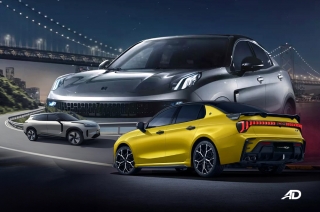
Swerving has long been a controversial subject for Filipino drivers. From misinformed arguments on the internet to baseless traffic tickets, this issue has polarized public opinion for quite some time.
That said, many motorists are still fearful of getting cited for this "violation." Whether they drive a small hatchback, an SUV, or a pickup truck, some drivers will go to great lengths to avoid swerving. It's unfortunate, and it may be contributing to a lack of knowledge on driving rules in the Philippines. So with that in mind, here is a quick explanation about what swerving is and the legalities behind it.
What is swerving?
Swerving can be defined as a sudden change in direction meant to avoid an object or get ahead of it. It's when a vehicle quickly changes from one lane to another, often without warning or using turn signals.
Depending on how it's executed, swerving can be a normal driving technique or a dangerous maneuver. There are proper ways to swerve on a vehicle—changing multiple lanes at once, not using signals, and driving too fast are not among them.
Is swerving a traffic violation?
According to the MMDA, swerving is not a traffic violation. At least, not by itself. On its own, there's nothing wrong with the act of swerving. It has its place on the road, and many drivers can do it well.
However, swerving can be prohibited in some cases. For instance, when a traffic sign explicitly disallows swerving, it's naturally a violation and will get you a ticket.
Swerving can also get you in trouble when done as part of reckless driving. If you swerve with abandon while disregarding road rules or cause damage to the road or other vehicles, expect to get cited and ticketed.
What to do if you get cited for swerving

It has been established that swerving on its own is not a punishable traffic violation. However, some traffic enforcers will still try to take advantage of a driver's lack of knowledge.
If you perform a swerving maneuver and a traffic enforcer flags you down, stay calm and ask what violation you committed. As swerving is not a real traffic violation, they cannot use this against you. If they attempt to do so, promptly explain your case and why you disagree with their citation.
Note that if the charge is reckless driving, it is recommended to accept the ticket and dispute it later if you have any concerns. If this is the case, collect the traffic enforcer's name and file a formal complaint with the appropriate agency.
There are ways to discourage traffic enforcers from preying on you. Knowing your road rules is a good first step. Getting a dashboard camera could do you wonders, as the mere sight of it may send erring officers away from your vehicle. It also gives you recorded evidence of whatever happens on the road, so any traffic violations or accidents can be seen clearly.
Can I swerve safely?
Swerving is a useful and sometimes necessary maneuver that all drivers have to do at some point. Don't swerve at high speeds and to get ahead of traffic. If you're going to swerve, only do it when needed and if it's clear to do so. Always stay aware of your surroundings and consider the safety of other motorists. Remembering these tips will help you use the road better and avoid getting cited for reckless driving.
Latest Features
-
An all-electric future: The Porsche Macan Electric / Featured Article
Porsche’s Macan goes all-electric; it’s a new beast with an electrified heart, yet unmistakably Porsche in performance and spirit.
-
Which Kia should I buy? / Featured Article
We’re here to help you decide which Kia vehicle is best for you, whether it’s a sedan, crossover, or minivan.
-
Why Lynk & Co is a good option for luxury car buyers / Featured Article
Lynk & Co offers premium value for those exploring the luxury market.
Popular Articles
-
Electric Vehicles in the Philippines for under P1 million
Jerome Tresvalles · Aug 19, 2025
-
Top 3 Cars For Every Lifestyle—What Cars Are Right For You? | Behind a Desk
Caco Tirona · Apr 24, 2024
-
5 Tips to Maximize Fuel Efficiency
Jerome Tresvalles · Sep 09, 2024
-
Five driving habits that are draining your fuel tank
Jerome Tresvalles · Jun 24, 2025
-
Can engine braking harm your engine?
Jerome Tresvalles · Sep 11, 2025
-
Do electric cars even need maintenance?
Jerome Tresvalles · Oct 23, 2024
-
Best vehicles for an active outdoor lifestyle
Shaynah Miranda · Jul 25, 2024
-
How to drive different types of vehicle transmissions
May 23, 2024
-
5 easy ways to keep your car interior clean
Allysa Mae Zulueta · Nov 15, 2021
-
How to survive Metro Manila traffic
Earl Lee · Aug 16, 2022



